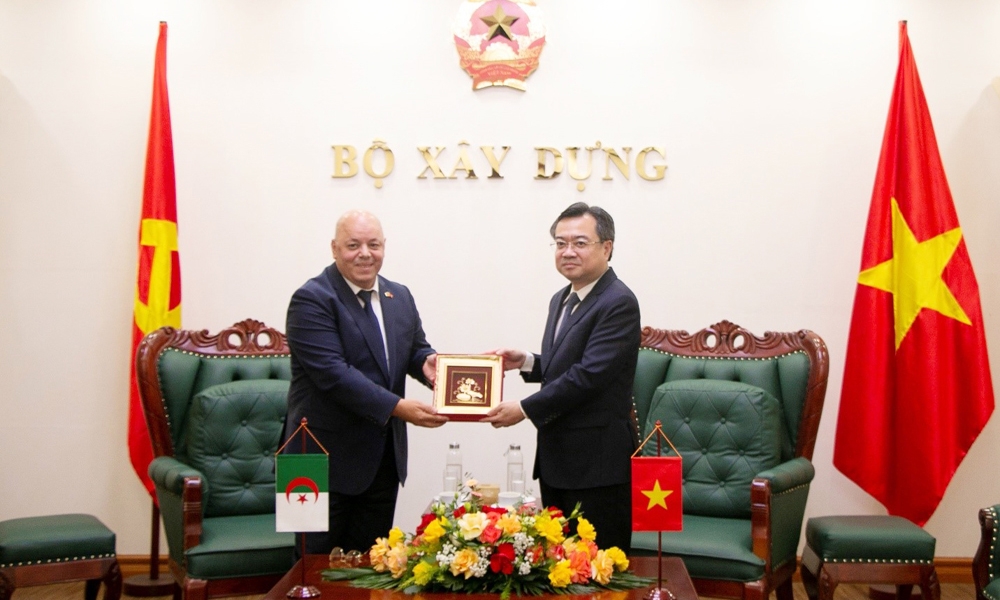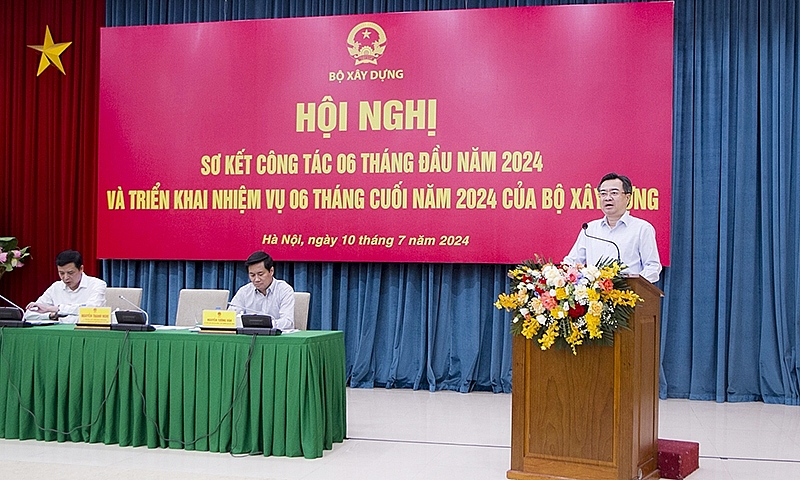Construction Industry in the First Six Months of 2024: High Growth Rate, but Many Challenges Remain
Construction Industry in the First Six Months of 2024: High Growth Rate, but Many Challenges Remain
(Construction) – On July 10th, Minister Nguyen Thanh Nghi chaired a conference to review the work of the first six months of 2024 and to implement tasks for the remaining six months of 2024 of the Ministry of Construction.

The construction industry's growth rate is the highest during the 2020–2024 period.
Immediately after the government issued Resolution No. 01/NQ-CP on key tasks and solutions to implement the socio-economic development plan and the state budget estimate for 2024, the Ministry of Construction issued Decision No. 60/QD-BXD on January 25, 2024, promulgating an action program with 10 tasks and solutions, 7 targets according to the targets assigned by the government to the Ministry of Construction, and the general targets of the government; 17 specific tasks in all management areas of the Ministry, clearly assigning the leading unit, progress, and completion time.
As of the end of June 2024, the Ministry of Construction has completed 40 out of 112 assigned tasks.
Special attention has been paid to institutional improvement. The National Assembly has commented on the Law on Urban and Rural Planning, included in the 2025 law and ordinance building program for the two laws on Water Supply and Drainage and the Law on Urban Development Management, and passed the Law on Real Estate Business and the Law on Housing, effective from August 1, 2024. Additionally, the Ministry of Construction has submitted to the government 5 decrees and 1 decision of the Prime Minister detailing the Law on Housing and the Law on Real Estate Business.

Moreover, the Ministry has advised the government and the Prime Minister on many decisive and effective solutions to address difficulties and obstacles for the real estate market and businesses. As a result, the real estate market has shown positive changes, overcoming the most challenging period.
During this time, the Ministry has proposed many solutions to boost the project of investing in at least 1 million social housing units by 2030, including advising government leaders to organize many conferences and meetings to direct implementation, solve difficulties and obstacles, and assign targets to each locality.
In the first six months of 2024, the Ministry of Construction actively coordinated with other ministries and sectors to address difficulties for national key projects, shortages of construction materials, control construction quality, and handle issues related to fire prevention and fighting.
Furthermore, the Ministry focused on implementing Resolution No. 06-NQ/TW, accelerating the appraisal of tasks and planning projects, organizing the appraisal of urban classification and the arrangement of administrative units, and strengthening the management of urban technical infrastructure.
Additionally, Minister Nguyen Thanh Nghi led a working delegation twice to work directly with three provinces: Dong Nai, Binh Duong, and Tien Giang, on the situation of production and business, public investment, construction, infrastructure, housing, and import and export in the area. To date, the ministries and sectors have answered the localities' basic recommendations.
Regarding implementing some plan targets, the growth rate of the construction industry in the first six months of 2024 increased by 7.34%, the highest increase compared to the same period in the years 2020–2024. The growth rate of real estate business activities increased by 2.45% compared to the same period in 2023. The urbanization rate nationwide is estimated to reach over 43.1%. The rate of urban residents supplied with clean water through centralized water supply systems is estimated to reach 92.9%.
The loss rate of clean water is about 16.2%. The rate of total collected and treated wastewater is about 17%. The average housing area per person is 26.3m2.
The production and consumption value of some construction materials showed positive signs compared to the same period in 2023. Cement production reached 42 million tons, an increase of 9% compared to the same period, and consumption is expected to reach 43.4 million tons, a decrease of 2% compared to the same period.
However, the construction industry still faces many difficulties and challenges from the global economy, the domestic economy in general, and the internal issues of the industry in particular.

The growth of the construction industry still depends significantly on the recovery of the real estate market, the progress of solving difficulties, and the implementation of public investment projects. Although the real estate market has shown many positive signs, it still has many limitations and obstacles. The target of 130,000 social housing units in 2024 is difficult to achieve. The activities of enterprises face many difficulties, especially construction materials and real estate businesses.
The early implementation of the Law on Real Estate Business and the Law on Housing creates high pressure in completing detailed guiding documents to ensure quality and progress according to requirements.
Strengthening efforts to remove difficulties for businesses and localities
In the discussion part, the Hanoi Department of Planning and Architecture proposed that the Ministry of Construction assist the city in concretizing the content of the Capital Law related to the state management tasks of the Ministry; concretize the Urban and Rural Planning Management Law; support the arrangement of administrative units; consider consolidating the work of granting architect practice certificates.
The Ho Chi Minh City Department of Construction proposed that the Ministry of Construction consider resolving some issues in the fields of green parks, water supply, drainage, urban lighting, and general technical infrastructure.
Regarding the 120,000 billion VND credit program for preferential loans to develop social housing, worker housing, and renovate and rebuild old apartments, the Department proposed that the Ministry of Construction consider taking the lead, coordinating with the Ministry of Natural Resources and Environment and the State Bank of Vietnam to remove obstacles in implementing the credit package according to the report in Official Letter No. 5563/UBND-DT dated November 9, 2023, of the City People's Committee.
The Da Nang Department of Construction proposed that the Ministry of Construction consider and guide four issues. First, give opinions on adjusting the general planning of Da Nang city until 2030, with a vision to 2045. Second, propose that the Ministry of Construction soon submit to the Prime Minister for issuing a decision on the procedures for approving the partial adjustment of urban planning and the partial adjustment of functional area construction planning to accelerate the progress and shorten the implementation time of planning in the city. Third, propose that the government direct the Ministry of Finance to soon advise on issuing a decree on drainage, water supply, street lighting, and cemeteries. Fourth, remove obstacles related to fire prevention and fighting in basic construction investment activities.
Regarding enterprises, the representative of the Vietnam Cement Corporation (VICEM) stated that the cement industry faced many difficulties in the first six months and forecasted that this situation would continue in the last six months of 2024. Therefore, VICEM proposed that the Ministry of Construction consider approving the plan to adjust and supplement charter capital; and continue to support solving existing problems and obstacles in the VICEM Operation and Transaction Center project packages.

The representative of the Housing and Urban Development Investment Corporation (HUD) proposed that the Ministry of Construction give opinions to Hanoi city to approve investment procedures for three social housing projects in Me Linh, Son Tay, and Van Canh; propose that the Ho Chi Minh City Department of Construction advise the Ho Chi Minh City People's Committee to approve procedures for the Hiep Binh Phuoc social housing project.
Representing the departments and divisions of the Ministry of Construction, the Department of Housing and Real Estate Market Management reported on two issues: developing and issuing decrees guiding the implementation of the Housing Law and implementing the project "Investing in building at least 1 million social housing units for low-income people and industrial park workers for the period 2021–2030."
On this occasion, Director Hoang Hai proposed that the People's Committees and local Departments of Construction strengthen coordination with the Ministry of Construction to disseminate housing laws; include social housing development targets in the local five-year and annual socio-economic development targets; review and supplement urban planning, industrial park planning, ensuring sufficient land fund for social housing development.
The Construction Activity Management Department has chaired and advised on developing a decree to replace Decree No. 15/2021 on project management of investment in construction to institutionalize three key task groups: continuing to propose removing obstacles, promoting decentralization of authority, ensuring administrative procedure reform and simplification in construction investment as stated in Government Resolution No. 105/NQ-CP; amending regulations that are no longer suitable to reality; adjusting and supplementing regulations to ensure synchronization with newly issued laws.
Meanwhile, the Legal Department reported more clearly on the construction of the Ministry's laws in the first six months and responded to the proposals of the Hanoi Department of Planning and Architecture regarding the issuance of construction practice certificates and the proposals of the Ho Chi Minh City Department of Construction on the allocation of land for exchange.
Higher determination to promptly complete assigned tasks
Contributing ideas at the conference, Deputy Minister Nguyen Tuong Van shared opinions on building a decree on green parks, the Urban and Rural Planning Law, and implementing the Urban and Rural Planning System. The Deputy Minister proposed that localities actively implement the planning, implement the Architecture Law, and develop architectural management regulations.
Deputy Minister Bui Xuan Dung proposed that the Science, Technology, and Environment Department coordinate with the Institute of Science, Technology, and Environment to guide localities on fire prevention and fighting for individual houses. The State Agency for Construction Quality Inspection should strengthen inspection, supervision, and acceptance of works. The Department of Construction Economics should research and issue a circular on construction norms, especially norms for key traffic projects.
Concluding the conference, Minister Nguyen Thanh Nghi assessed that the construction industry faced many difficulties in the first six months of 2024, requiring units under the Ministry and localities to have higher determination to promptly complete assigned tasks.
Although the construction industry has achieved positive results in the first six months, the Minister still requested that units be proactive, active, and urgently implement key tasks to achieve the goals set for the last six months.
Among them, the Ministry of Construction will focus on implementing a key task: improving the quality and progress of building laws, implementing the issued laws, and overcoming the shortcomings in policy implementation. Specifically, it is necessary to promptly and comprehensively develop and issue guiding documents for the Housing Law and the Law on Real Estate Business, the Law on Water Supply and Drainage, and the Urban Development Management Law. The Ministry of Construction also needs to coordinate with the Ministry of Justice to solve problems in building laws and guiding documents.
The Ministry of Construction needs to strengthen inspection, supervision, and quality assurance of construction works; ensure timely and comprehensive removal of difficulties and obstacles for localities and businesses; coordinate with relevant ministries and sectors to handle issues related to fire prevention and fighting, ensuring safety in construction investment.
The Minister also emphasized that the Ministry of Construction must continue to actively implement social housing development solutions, striving to achieve the target of 130,000 units in 2024. This requires localities to urgently review and supplement the land fund, allocate resources, and remove obstacles in investment procedures.
In addition, the Ministry needs to strengthen digital transformation in construction management, ensuring transparency and efficiency; enhance the training and capacity building of cadres, civil servants, and public employees in the industry.
Finally, the Minister requested units under the Ministry to proactively and actively coordinate with localities, ministries, and sectors to implement tasks and solutions, ensuring the construction industry continues to develop sustainably, contributing to the overall socio-economic development of the country.
